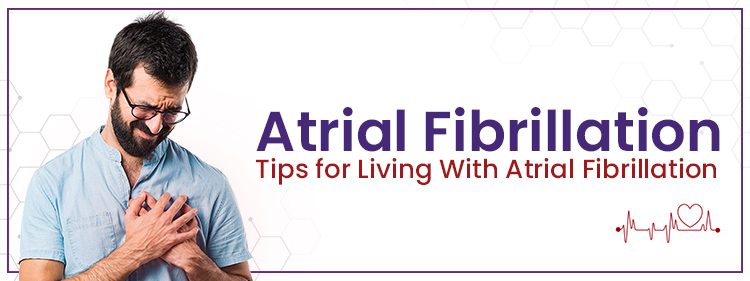
August 30, 2025
Postpartum Depression Help: What New Moms Need to Know Right Now
March 22, 2023 - admin

Atrial Fibrillation is a condition that disrupts the heartbeat. The upper chambers are the heart's atria, and these chambers make their own electrical signals (Fibrillation) instead of following the regular heart rhythm. This irregular beating can cause fast, fluttering heartbeats — between 100-175 beats per minute — instead of 60-100 beats per minute. Most people are ignorant that they have Afib, but when symptoms of Atrial Fibrillation influence their life, it becomes difficult to manage.
If you are living with Atrial Fibrillation, you might feel faulty electrical signals which lead to these symptoms:
1. Chest pain
2. Palpitations in the heart
3. Irregular pulse
4. Breath shortness
5. Lightheaded or dizziness
These symptoms are the signals that indicate you have Atrial Fibrillation, which prevents your heart from pumping and causes slower blood flow leading to the form of a blood clot, causing a stroke, heart attack, and other heart difficulties.
The actual cause of Atrial Fibrillation is yet propounded, but it is likely seen in adults, and people of a certain group are more affected than others. Atrial Fibrillation is commonly found in people with certain heart conditions, likewise:
1. High blood pressure
2. Problems with heart valves
3. Heart failure
4. Coronary artery disease and heart attacks
Other medical conditions also responsible for Afib, including:
Asthma: When your lungs find it harder to blow, oxygen prevents the heart from pumping blood at a regular pulse rate slightly, causing Afib.
Lung cancer: There is the possibility that lung cancer can cause Afib because cancer spreads over the heart and provoke heart conditions.
Pneumonia: When pneumonia causes acute respiratory failure leading to Atrial Fibrillation.
Type 2 diabetes: When Glucose and insulin are imbalanced, your body can directly touch the atrial myocardium and muscular chamber in the heart, leading to Atrial Fibrillation.
Carbon monoxide poisoning: Carbon monoxide leads to harmful cardiac effects and can be the reason for Afib.
Treatment for Atrial Fibrillation relies on your Afib period, symptoms, and the cause of the heartbeat difficulty. The purposes of treatment are to:
1. Reset the heartbeat.
2. Regulate the heart rate.
3. Prevent blood clots that cause a stroke.
Atrial fibrillation treatment may concern with:
1. Medications
2. Therapy to reset the heart rhythm (cardioversion)
3. Surgery or catheter procedures
Life with Atrial Fibrillation might be challenging. But you can stay active and energetic by taking the right treatment and adding lifestyle changes. Many people assume that AFib has left no impact on their everyday lives. But some are still troubled with shortness of breath, weakness, or fainting.
Here are a few simple changes you can make a practice to protect your heart and help you feel your best:
Eat healthily: Add some vitamins and protein to your diet, Switch to a low sodium diet, stay away from alcohol, and regular intake of vitamin K helps manage life with Afib.
Set weight controller: Atrial Fibrillation is a type of irregular heartbeat. The risk of AFib increases when you are overweight or obese. You can reduce the chance of having AFib by losing 10% of your body weight with diet and regular exercise if your doctor or dietician tells you you're obese.
Stop Smoking: Smoking raises your chances of heart disease and a heart attack, even if you don't have a heart attack now. It also increases the likelihood that you'll develop atrial fibrillation, the most common type of abnormal heartbeat —which can lead to an increased risk of stroke over time.
Get proper Sleep: Sleep apnea is a sleep disorder that can stop your breathing during the night. Often, you may forget to stay conscious of your breathing while sleeping; however, there are many proven ways to improve your sleep by treating this sleep apnea condition.
Be More Active: There's no need to stop exercising when you have atrial fibrillation. Staying active will improve your heart health and help control your weight. You can even start a fitness program as long as you see your doctor first so they can watch for signs of AFib during exercise.
When dealing with Atrial fibrillation, one of the essential things you can do when managing this condition is to follow your natural homeopathic doctor treatment plan. At the naturopathy healing center, doctors will guide your prescription and prevent you from making any wrong choices. Also, stay on top of keeping up with your medicines and supplements then, it will be easier for you to manage and live with your condition. Get to know more about atrial fibrillation with Dr2health.
Tags:


Leave a comment